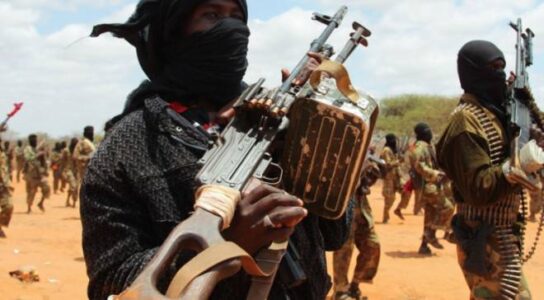
Al Shabaab terrorists control town in central Somalia
In a series of photos released last week by Shabaab, al Qaeda’s branch in East Africa, the jihadist group highlighted the level of control it maintains over the town of Bacaadweyne in Somalia’s central Mudug region. The group officially took over the town last month.
Released through the group’s Shahada News Agency, Shabaab said the photos document the distribution of “Eid gifts” including food and clothing aid, to more than 300 people in Bacaadweyne.
The photos show clan elders and others participating in an event before Shabaab representatives distribute the aid and “gifts.”
This recent photoset comes just few weeks after a previous release showed the jihadists distributing food across the town, further demonstrating the groups continued control over the locale.
Additionally, Shabaab’s statement alleges that its commanders met with elders from the local Qubeys clan, a sub-group of the much larger Dir clan, to “welcome the brothers from the clan who entered into the authority of the Islamic Shari’a and whose regions joined the Islamic Wilayats [provinces] under the control of Shabaab.”
Despite Shabaab’s positive spin on the agreement with the Qubeys, local media has reported the political deal was less than amicable. For instance, local media reported that Shabaab and clan elders penned a deal due to Qubeys militiamen taking part in several battles against Shabaab alongside the Somali military.
Prior to Shabaab taking control over Bacaadweyne last month, Qubeys militiamen and Somali troops fended off several prior attempts to take over the town. As a result, the recent agreement between Shabaab and the clan reportedly stipulated that the Qubeys will allow Shabaab to control the town if it does not take retribution against those who formerly fought against it.
The political arrangement with the Qubeys clan thus serves as another example of how Shabaab manipulates Somalias intricate clan system for its own benefit and expansion. Similar deals with various clans and sub-clans throughout southern and central Somalia have allowed the group considerable operating space and popular support.
And despite the violent build up to the deal, Shabaab is still able to spin the agreement with the Qubeys as a victory for its Islamic governance project which it often touts as being above the clan system. It is clear that the Qubeys resisted Shabaabs attempts to control their towns and villages. But since signing the agreement with Shabaab, the jihadist group is now portraying the clan as a willing participant under its shadow government.
The al Qaeda branch took control over Bacaadweyne last month after local Somali military units vacated the town. Somali officials have been quiet about the groups control over the town, but the semi-autonomous state of Puntland and the state of Galmudug, another member of Somalias federal government, have signed an agreement to cooperate in retaking Bacaadweyne.
Shabaab previously made several attempts to capture Bacaadweyne. For instance, last June it launched a suicide assault on the local military base killing at least 6 people. In December 2020, it briefly claimed control over the town before Somali authorities retook the locale with the help of Qubeys militiamen. And in January, at least 8 clan members were killed after another clash inside the town.
The central Mudug region has been the target of increased Shabaab activity in recent years. Last year, the jihadist group assassinated the governor of Mudug in a suicide bombing while also mounting numerous attacks near Galkayo and El-Buur. Galmudug state forces have been in a contentious battle for control over several areas in the region since last summer.
While Shabaab has put a considerable amount of resources into expanding in central and north-central Somalia, it continues to launch assaults in southern Somalia. Just yesterday, 6 people, including 5 police officers, were killed a suicide bombing in Mogadishu claimed by Shabaab.
According to data compiled by FDD’s Long War Journal, the group has conducted at least 9 suicide bombings across Somalia so far this year.
Despite some setbacks in recent years, Shabaab continues to be one of al Qaeda’s most effective branches. It maintains significant control over much of southern Somalia and retains the ability to strike in Mogadishu, Kenya, and against heavily fortified bases in both Somalia and Kenya.
Source: Long War Journal





